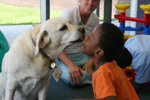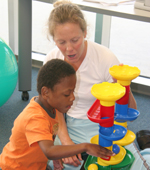Program facilitates progress, growth
for medically fragile foster children
by
Heather WoolwinePublic Relations
Robin Smith has lost count of the children.
After 18 years as a biological, foster and adoptive parent, she suspects that the number of children that she has rocked, clothed, fed and loved numbers somewhere close to 50. Maybe more. Now, she is counting on MUSC Children’s Hospital’s Medically Fragile Children’s Program (MFCP) to help her in the care of the newest addition to the family, Sam.
 Lola, the MFCP
therapy dog, gives Sam a big hello during a recent visit.
Lola, the MFCP
therapy dog, gives Sam a big hello during a recent visit.Sam came to the Smith family when he was just a 6-month-old patient in the MUSC neonatal intensive care unit. Smith, who lives in Georgetown County, got the call and was asked if she would consider taking in a foster child who would have nutritional issues.
“The MFCP has turned into the best thing for us because most of the appointments that Sam needs are all in one place,” Smith said. “Despite the drive from Awendaw to North Charleston, it really has made our lives, especially Sam’s, easier. He needs it, and it’s been great for him. I’m happy to come here.”
The former preschool teacher, known by family and friends as a person with never-ending compassion, couldn’t say no.
“Becoming a foster parent happened gradually,” Smith said. “In the beginning it was children without special needs, but honestly, after Hugo DSS asked if I would take a child with a feeding tube and I couldn’t say no. With each child, it becomes a greater challenge. Sam was over the top.”
A few weeks shy of his first birthday, Sam was released from the hospital with several health issues related to his premature birth, including high frequency hearing loss, vision impairment, a reactive airway, subglottic stenosis (narrowing of the esophagus and scar tissue due to prolonged intubation), short gut (76 percent of his small intestine was removed), developmental delays and disabilities related to a bout with fungal meningitis.
“He came home with a [tracheotomy] catheter, and a feeding tube that fed him drops of food over a period of hours because that was all he could handle. Each night, he required intravenous feedings as well. It was a little overwhelming at first because we’d had no formal nursing training or experience,” Smith said.
Today, Sam’s progress is a testament not only to a family’s love, but also to the coordinated care of the MUSC Children’s Hospital and the Smith family’s willingness to seek the best care.
By the time Sam was 3-1/2 years old, Smith had various health care professionals coming to her home for Sam’s care. When she was told about a new program for medically fragile children in the foster care system based out of the Children’s Hospital, Smith re-evaluated Sam’s care plan. He no longer needs a catheter, and since his enrollment during the MFCP’s inaugural year, he’s eating puréed foods or a special high-calorie super pudding that eliminates the feeding tube for the first time in his life. “He doesn’t even use the tube anymore. When this last tube comes out, that will be one of the biggest things that we have gotten out of this program since August,” Smith said.
Sam’s language is emerging, he’s gained more control over his motor functions, and his ability to manipulate objects with his hands has improved.
At the MFCP, Sam has access to almost all of the providers he needs at once, so he can see his physical and occupational therapists, physician and nutritionist during the same day and time frame. “Before we got him into this program, he didn’t walk well and he didn’t know how to communicate with us other than crying. With the help of everyone here, he now knows how to get our attention and ask for things. Just to get the idea of language across, and for him to be able to tell me when he wants something to eat or drink, or that he wants to go outside, is wonderful,” Smith said, “Because of this program, his progress has been quicker and easier.”
MFCP is a partnership between the MUSC Children’s Hospital, the U.S. Department of Heath and Human Services, and S.C. Department of Social Services (DSS), and is the first of its kind in the nation. It was created to serve medically-complicated children from newborns to 21 who are in foster care in the Charleston area. It is located off campus in the old Roper North facility.
The first model of an all-inclusive, family centered healthcare for special needs children in foster care in the United States, the program opened at MUSC in August 2005. Its concept is based on the idea of the one-stop center that provides primary care, nursing care, medications, physical therapy, occupational therapy, speech therapy, supplies, durable medical equipment, nutritional counseling, a day program and care management all at one location.
 Sam plays with MFCP
occupational therapist Katie Myers.
Sam plays with MFCP
occupational therapist Katie Myers.“We want to deliver care to these children in the most family-friendly way possible,” said Kara Blevens, M.D., MFCP medical director. “When you promote the family, you promote the child and that is a very natural concept once you get used to the idea and move past traditional ideas of delivering medical care. Family is important for all children, no matter what background they come from or whether it’s a biological, foster or adopted family.”
Blevens sees her role as a facilitator of care, not the all-knowing stereotypical physician. “I’m here to be the family’s friend and guide. I don’t navigate the process for them either. The family and the child have to learn to take care of themselves, not just be told what to do.”
Eventually, the program will be extended to all Medicaid-eligible, medically complicated children in the area who meet enrollment criteria. One hundred percent of the enrolled children have improved medical outcomes. According to Pat Votava, MFCP manager, adoption rates for foster care children with special needs were 5 percent before the inception of the MFCP. Now the rate is 50 percent for children in the program.
In the name of love
Why would someone decide to become a foster parent? A simple philosophy based on altruism and a desire to open the heart to innocent children whose circumstances cast them away from what is brightest and best in society.
“For Doug and me (Smith’s husband of 27 years), it’s always been about love and becoming a family. It’s fulfilling; I know it’s what I’m meant to be doing,” Smith said. “You become very dedicated to the children and they become yours, you can’t imagine anyone else taking care of them.”
When families become so attached to foster children, adoption is the logical next step. Sam will be the fourth adoption for the Smith family. Biological children Jenny, 29; Sarah, 26; and Michael, 22; arrived first; and then adopted children James, deceased; Meghan, 18; David, 6; and Sam, 4 came along.
Smith cites a focus on the positive that enabled her family to continue welcoming children via foster care and adoption. “There’s always a downside to anything, but if you focus on the downside then you won’t do it. When I think about how much we’re helping these children, how much fun it is, how wonderful they are and how rewarding it is, all the other stuff doesn’t really matter,” she said.
However, Smith does feel it’s important for people to enter a foster care or adoption situation with eyes open. She explained that, yes, the government channels and system can be frustrating.
“People have to realize that most social workers are just doing the best they can. They are overwhelmed, underpaid and dealing with a crazy system, she said. "A lot of people give up because it can be so tough, and it’s not always the perfect situation and the children are not always grateful. Sure it could all be a lot better, but it’s what we’ve got to work with right now and you put up with it to help the children.”
Becoming a foster parent
The Lowcountry continues to receive an influx of children in need of warmth, love, safety and security. For those interested in becoming a foster parent, DSS advises that:
- No one in the home who is 18 or older can have any criminal convictions or anyone 12 or older listed on the sex offender registry.
- Prospective foster parents cannot have a substantiated report of child abuse and neglect.
- All family members must be in agreement to become a foster family, and they must be supportive.
- Foster families must exhibit qualities that will allow them to be positive role models for foster children.
- Foster families must exhibit a genuine interest in and willingness to help troubled children who were victimized.
- Foster parents cannot adopt the foster child placed in their home if their parental rights have been removed for biological children.
- Foster parents cannot work outside the home.
- Single parents cannot become foster parents.
When someone decides to become a foster parent, all those family members living in the same household must be interviewed to determine the level of commitment and anyone older than 18 must submit to a background and fingerprint check. The application process is detailed, and includes DHEC and fire marshal inspections of their home, financial declarations, and DSS staff will conduct a search for character references.
For more information about becoming a foster parent for special needs children, call Sack at 740-1570 ext. 206, or Sandra Bligen-Frazier at 740-1570 ext. 205.
For regular foster care recruitment, call Pat Henderson at 953-9586.
Friday, June 23, 2006
Catalyst Online is published weekly,
updated
as needed and improved from time to time by the MUSC Office of Public
Relations
for the faculty, employees and students of the Medical University of
South
Carolina. Catalyst Online editor, Kim Draughn, can be reached at
792-4107
or by email, catalyst@musc.edu. Editorial copy can be submitted to
Catalyst
Online and to The Catalyst in print by fax, 792-6723, or by email to
catalyst@musc.edu. To place an ad in The Catalyst hardcopy, call Island
Publications at 849-1778, ext. 201.